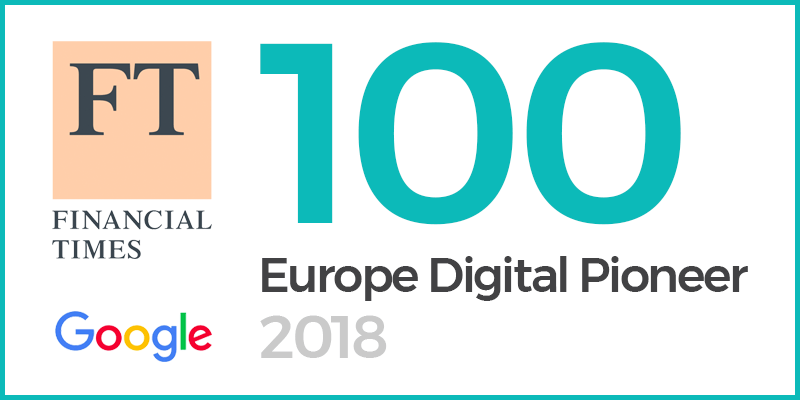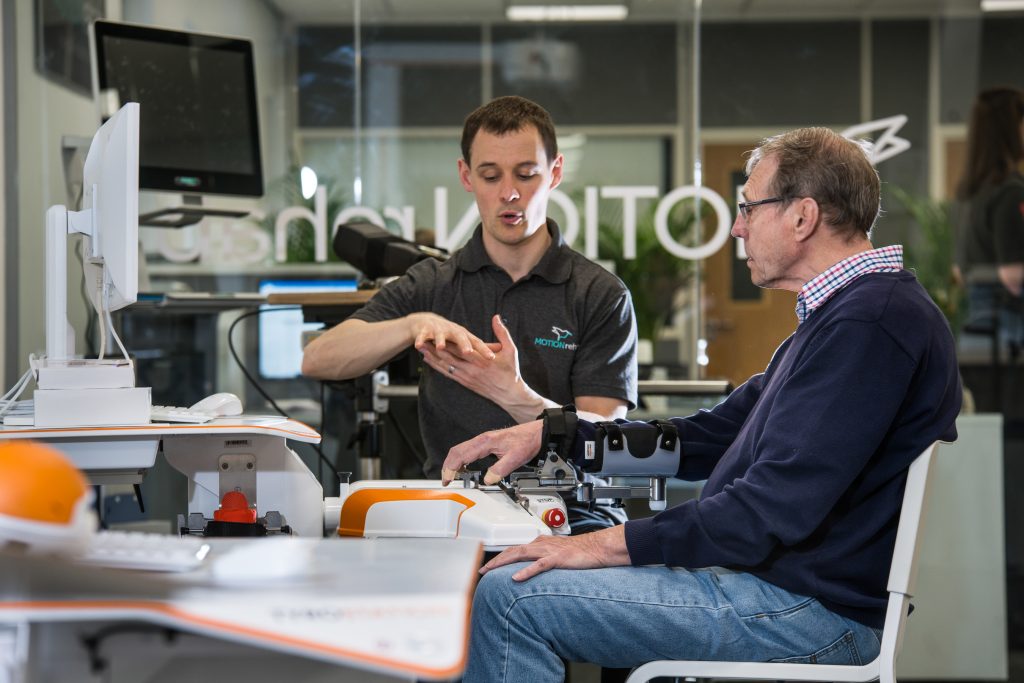How MOTIONrehab can help
The aim of rehabilitation is to help people do as much for themselves as possible, help them achieve their goals whether that be to get around the house, out and about in the community or back to work. MOTIONrehab recognises that everyones goals are personal to them and we take a person-centred approach to our rehabilitation programmes.
Get in touchPioneering Intensive Neurological Rehabilitation Centres
In April 2018, MOTIONrehab pioneered intensive neurological rehabilitation augmented with Robotics and VR by launching the UK’s first intensive neurological rehabilitation centre based in Leeds.
The pioneering concept offers specialist one-to-one hands-on therapy from experienced and highly skilled clinicians and uniquely accompanied by high intensity specialist rehabilitation training with robotic, virtual reality and sensor-based devices. This allows patients to practice high repetitions of movements which is critical to neuroplasticity and recovery.
Our evidence-based approach helps our patients reach their potential faster and is endorsed by the recent Stroke Guidelines which were updated in 2023.
The success achieved by our patients adopting this approach has resulted in MOTIONrehab opening further clinics in Hull and new for 2024 in Doncaster to allow more patients to reach their potential.
Get in touch
MOTIONrehab can help with
Specialist Rehabilitation
MOTIONrehab® offers specialist rehabilitation to help promote the re-wiring of the nerve pathways, helping people with the things they might find difficult to do. This may be things as simple as standing from a chair, getting to the toilet or getting out and about in the community to riding a bike or returning to work.
We can help people at any stage, whether they’re experiencing recent problems or have been struggling for some time. MOTIONrehab® starts with an assessment to identify our patient’s difficulties and find out what is important to them. After this we put together a personalised treatment programme using hands-on therapy, exercises and state of the art rehabilitation technology to help individuals achieve their goals
See more client storiesOur services
MOTIONrehab accepts national and international referrals. Clients are able to self-refer or alternatively MOTIONrehab accepts referrals from Consultants, GP’s Private Insurance Companies, Personal Injury Claims, CHC, IFR. MOTIONrehab is happy to work in partnership with your GP, Consultant or other health professionals. MOTIONrehab’s services include:
Frequently asked questions
A Stroke is the term used to describe the injury caused to the brain when it does not get enough blood supply. This can be caused by a blockage in the blood vessels or a bleed into the brain. Blockages may be due to a blood clot or a narrowing of the blood vessel which prevents the blood getting to the brain tissue on the opposite side. These are called Ischaemic Strokes. Bleeds are caused when the wall of the blood vessel becomes weak and bursts causing bleeding into the brain. These are called Haemorrhagic Strokes.
Ruptured Aneurysm

Thrombus

Embolism (blockage)

Sometimes there is a temporary blockage in the blood supply to the brain which clears of its own accord, quickly and before any lasting damage to the brain is done. This is called a Transient Ischaemic Attack or TIA.
The effects of a Stroke depend which part of the brain has been affected and what that part of the brain controls.
Commonly, people have difficulties with movement. Stroke generally causes weakness down one side of the body. This is called a hemiparesis. It can also affect your sensation or how you feel things. People can have numbness in their arms and legs which can impact on their ability to move and do day to day activities.
Other areas affected can be speech, vision or thinking skills (cognition).
After a Stroke people with speech problems may struggle when they are trying to say the right words or have difficulties understanding and become a little muddled in conversations. A Stroke can also cause problems seeing the whole picture as areas of vision can be lost.
When someone’s cognition is affected they may struggle with concentrating, planning and organising things.
MOTIONrehab™ starts with an assessment to identify our patient’s difficulties and find out what is important to them. After this we put together a personalised treatment programme using hands-on therapy, exercises and state of the art rehabilitation technology to help individuals achieve their goals We will then discuss the options for your rehabilitation including whether intensive rehabilitation would work for you.
Research suggests that recovery tends to be at its fastest within the first 18 months to 2 years following injury or illness. However, after this period people can still make life changing improvements with rehabilitation as the brain and body are still able to change. However, the rate of change is just slower than immediately after onset. The MOTIONrehab™ Team have had great success and positive outcomes numerous years after initial illness or injury. (Please see our case studies and testimonial section). During your first appointment, your therapist will discuss your individual goals and be able to advise on possible improvements and outcomes.
On arrival you will be provided with our Terms and Conditions of Business and the relevant consent forms to agree to treatment. If you would like to receive these in advance of your appointment please contact our Client Services Team on 0800 8600 138. and they will assist you. If received in advance please bring the completed document with you to the first appointment.
As part of your initial assessment, your physiotherapist will need to take details of your medical history, present condition, allergies/sensitivities and current medications. Please come to the appointment in comfortable clothing, for example, shorts, t-shirt, and trainers.
Get in touch with us
For more information about how MOTIONrehab can help following a stroke, please feel free to get in touch with us by giving us a call, or alternatively fill out the form here and we’ll get back to you as soon as possible.






 0800 8600 138
0800 8600 138  info@MOTIONrehab.co.uk
info@MOTIONrehab.co.uk